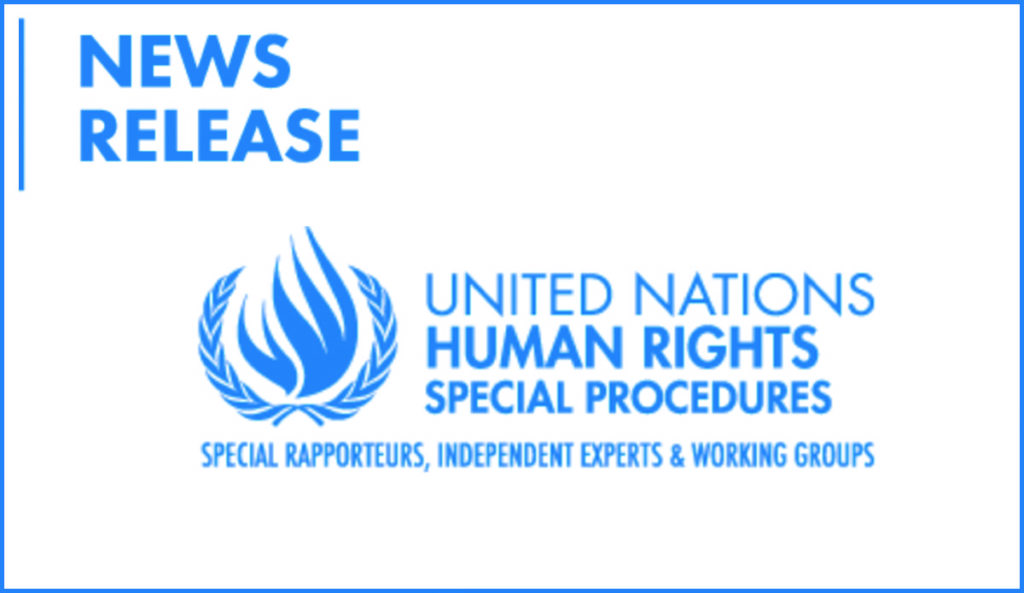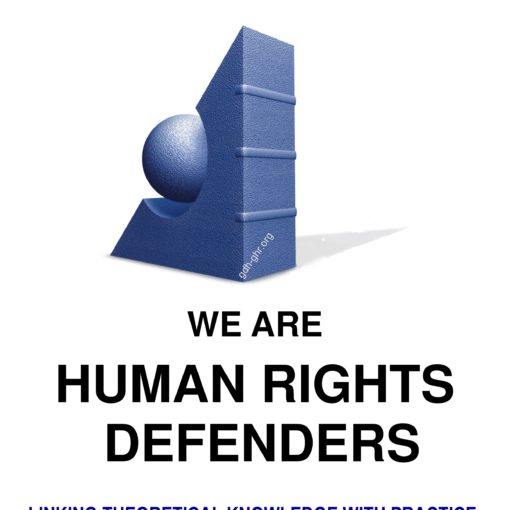
Statement of 17 mandate holders (16 March) [1]
‘While we recognize the severity of the current health crisis and acknowledge that the use of emergency powers is allowed by international law in response to significant threats, we urgently remind States that any emergency responses to the coronavirus must be proportionate, necessary and non-discriminatory’.
‘Declarations of states of emergency, whether for health or security reasons, have clear guidance from international law. The use of emergency powers must be publicly declared and should be notified to the relevant treaty bodies when fundamental rights including movement, family life and assembly are being significantly limited’.
‘Moreover, emergency declarations based on the Covid-19 outbreak should not be used as a basis to target particular groups, minorities, or individuals. It should not function as a cover for repressive action under the guise of protecting health nor should it be used to silence the work of human rights defenders’.
(…) ‘We encourage States to remain steadfast in maintaining a human rights-based approach to regulating this pandemic, in order to facilitate the emergence of healthy societies with rule of law and human rights protections’.
Declaration of 42 independent experts (26 March 2020)
The Declaration stressed that ‘in addition to public health and emergency measures, battling the COVID-19 pandemic, must respect the fundamental human rights of every individual‘.
‘Everyone, without exception, has the right to life-saving interventions and this responsibility lies with the government’ (…) and ‘the scarcity of resources or insurance schemes should never justify discrimination against certain groups of patients’. They cited persons with disabilities, older persons, minorities, internally displaced, those living in extreme poverty, people in detention, homeless, migrants, refugees.
They added that ‘all human rights’ were equally as important and that non-discrimination, participation, empowerment and accountability must be applied ‘to all health-related policies’.
The Declaration supported the measures recommended by the WHO, but added that addressing this crisis is more than that: ‘States must take additional social protection measures so that their support reaches those who are at most risk of being disproportionately affected by the crisis”, they spelled out, including women, “who are already at a disadvantaged socio-economic position, bear an even heavier care burden, and live with a heightened risk of gender-based violence’.
Paying tribute to health workers who are heroically battling the outbreak, the experts added that Covid-19 was a serious global challenge, but also ‘a wake-up call’ to revitalize universal human rights principles, which, along with trust in scientific knowledge, ‘must prevail over the spread of fake news, prejudice, discrimination, inequalities and violence’.
Other statements of mandate holders
In a statement of 27 March, the Special Rapporteur on violence against women pointed out that restrictive measures to fight the pandemic were intensifying the risk of domestic violence. ‘For many women and children, home can be a place of fear and abuse that is heightened by the pandemic’ (…). ‘All States should make significant efforts to address the COVID -19 threat, but they should not leave behind women and children victims of domestic violence, as this could lead to an increase of domestic violence including intimate partner femicides’. The statement was endorsed by five other thematic procedures.
In a joint appeal, the Special Rapporteur on the sale and sexual exploitation of children, and the UN Special Representative on violence against children, called on States ‘to boost child protection measures to help safeguard the welfare of millions of children who may be more exposed to violence, sale, trafficking, sexual abuse and exploitation during the ongoing COVID-19 pandemic’ (7 April).
Fearing a needless increase in Covid-19 deaths due to discrimination, the Working Group on People of African Descent called for ‘Governments to commit to racial equity and equality in their response to the pandemic’ (…) as ‘structural discrimination could worsen inequalities surrounding access to healthcare and treatment, which could lead to a rise in disease and death rates among people of African descent’ (6 April).
‘Governments must ensure that their response to the Covid-19 pandemic does not contribute to xenophobia and racial discrimination, and must eradicate xenophobia throughout all State policy and messaging’, said the Rapporteur on racism on the occasion of the International Day for the Elimination of Racial Discrimination (23 March).
In a press release, the Special Rapporteur on the rights of minorities reported that ‘politicians and groups were exploiting fears surrounding the disease to scapegoat certain communities, leading to a rise in violence against them’. He quoted physical attacks against Asians, hate speech blaming Roma and Hispanics for the spread of the virus, and calls by some political leaders for migrants to be denied access to medical services (30 March).
The Rapporteur on internally displaced persons (IDPs) urged States to immediately step-up their measures to protect the 40 million IDPs worldwide from the Covid-19 threat. IDPs ‘are at heightened risk of exposure to Covid-19 due to limited access to healthcare, water, sanitation, food and adequate housing, and often face discrimination’ (…) ‘those in camps or collective sites, she added, often find themselves living in overcrowded conditions, with emergency shelters not physically and structurally adequate for mitigation of Covid-19 transmission. Their vulnerability is heightened in contexts of armed conflict’ (1 April).
In their statement of 3 April, the Rapporteurs on migrants and on trafficking in persons called ‘States worldwide must urgently adopt inclusive measures aimed at protecting migrants and trafficked persons in their national response to Covid-19, such as prevention measures, testing, medical treatment, health services and social assistance’. States should ‘take steps towards the regularisation of undocumented migrants whenever necessary, in view of facilitating their access to health services during the fight against the pandemic’.
As Governments worldwide are relying on people to stay home to prevent the spread of the pandemic, the Rapporteur on the right to adequate housing said States ‘must take urgent measures to prevent anyone falling into homelessness and ensure access to adequate housing for those without’ (…) ‘Home has rarely been more of a life or death situation’. She expressed her deep concern about two specific population groups: those living in emergency shelters, homelessness, and informal settlements, and those facing job loss and economic hardship which could result in mortgage and rental arrears and evictions (18 March)
Eight experts endorsed the statement of the Rapporteur on the right to safe water and sanitation. ‘As washing hands with soap and clean water is vital in the fight against COVID-19, governments worldwide must provide continuous access to sufficient water to their populations living in the most vulnerable conditions’. The statement added that the global struggle against the pandemic had little chance to succeed if personal hygiene, the main measure to prevent contagion, was unavailable to the 2.2 billion persons who have no access to safe water services (23 March)
As the world exhibits new bonds of solidarity in response to the coronavirus pandemic, it is a matter of ‘humanitarian and practical urgency to lift unilateral economic sanctions immediately’, to prevent hunger crises in pandemic-hit countries, said the Rapporteur on the right to food (31 March).
In a letter to Governments and international financial institutions, the Expert on debt and human rights said public investments ‘should also aim at reaching small and mid-size enterprises, creating long-term sustainable employment, prioritising human rights and promoting a greener economy’. Deploring that ‘some stakeholders promote an approach consisting in ‘saving the economy’ at any costs’, the Expert called on States to ‘dramatically increase spending that targets inequalities and poverty caused by the COVID-19 crisis, and not just bail out corporations, banks and investors without human rights or social conditions attached’ (15 April).
‘States and business leaders must step up efforts to ensure that the selfless doctors, nurses, first-responders and other medical professionals working on the frontlines of the COVID-19 pandemic receive adequate protective equipment’ (Rapporteur on the implications of management and disposal of hazardous substances and wastes, 27 March).
‘Society has a duty to exercise solidarity and better protect older persons who are bearing the lion’s share of the COVID-19 pandemic’, theExpert on the rights of older persons said. (…) ‘Reports of abandoned older persons in care homes or of dead corpses found in nursing homes are alarming. This is unacceptable’. Her statement was endorsed by 33 thematic procedures (27 March).
Reacting to the decision of several governments to lower environmental standards, suspend environmental monitoring requirements, reduce environmental enforcement, and restrict public participation, the Rapporteur on human rights and the environment, said that the pandemic should not be used as an excuse to weaken environmental protection, ‘In light of the global environmental crisis that predates Covid-19, these actions are irrational, irresponsible, and jeopardize the rights of vulnerable people’, he said (15 April).
As the global pandemic reaches Syria, the Commission of Inquiry on Syria called on the parties to cease fighting and allow space for urgent measures to be taken to avoid further catastrophe (28 March).
The Eminent International and Regional Experts on Yemen expressed their deep concern about the potential risks of the spread of Covid-19 among detainees and prisoners and called for immediate release of political prisoners and detainees in Yemen (30 March).
Members of the Commission on Human Rights in South Sudan noted that a severe coronavirus outbreak across South Sudan ‘would have disastrous consequences for millions of vulnerable civilians’, and urged the Transitional Government ‘to step up efforts to contain the spread of the virus, including by working to halt all armed hostilities’ (8 April).
15.04.2020




